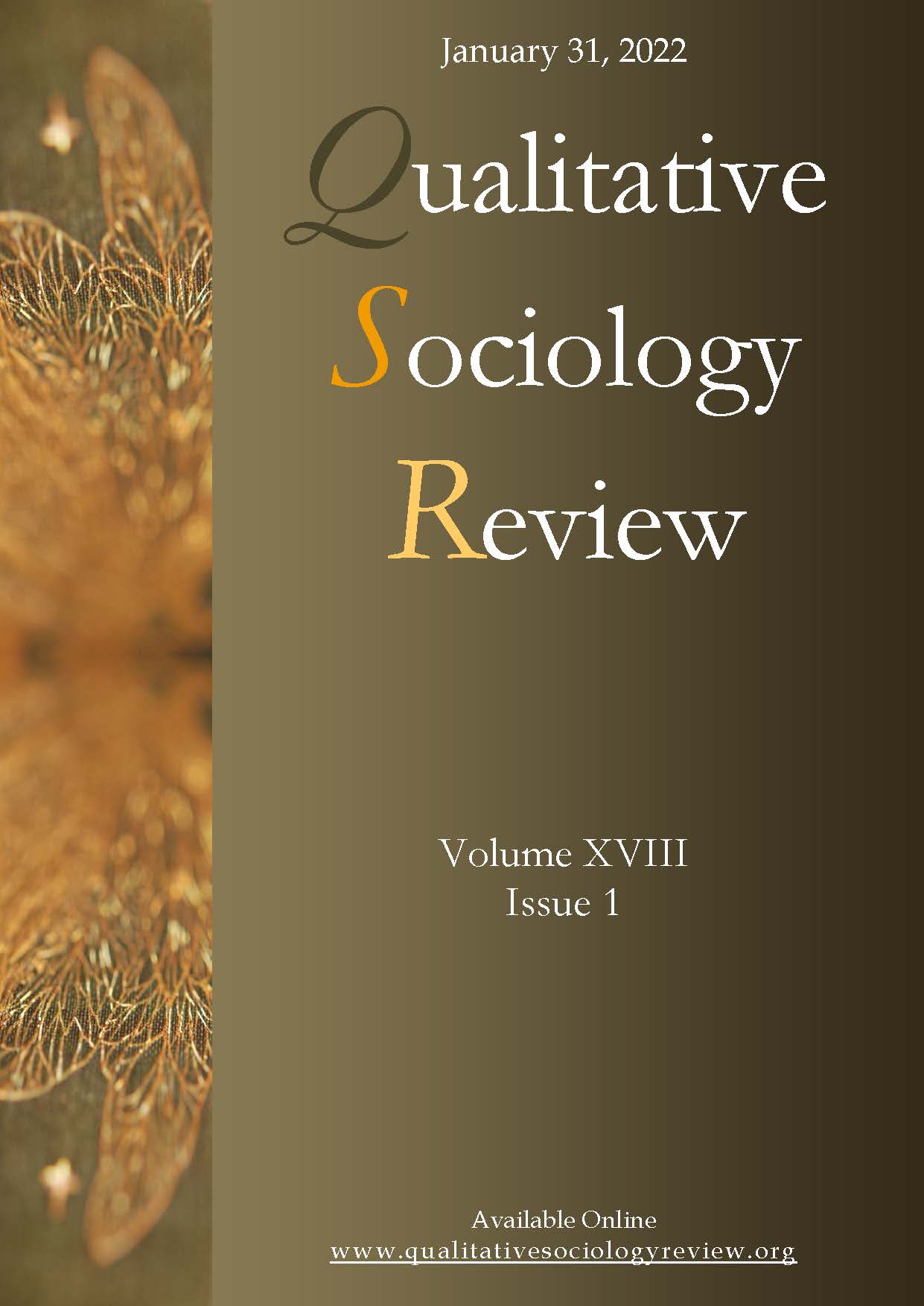Stressors and Coping Mechanisms among Extended-Stay Motel Residents in Central Florida
DOI:
https://doi.org/10.18778/1733-8077.18.1.05Keywords:
Extended Stay, Motel Residents, Hotel, Social Support, Homelessness, Stress, CopingAbstract
Not having a permanent home means living in a constant state of stress. Though much has been written about homelessness and its stressors, very little research has focused on the experiences of those living in liminal housing, such as extended-stay motels. As affordable housing units dwindle in the US, more individuals and families with children have moved into extended-stay motels. In this study, I explore stressors that low-income families living in extended-stay motels experience, as well as their coping mechanisms. Through semi-structured interviews with 18 families with children living in extended-stay motels in the Central Florida region, consistent financial and emotional stressors were identified among all families. Additionally, gender and the community feel of a motel impacts the magnitude of the stress, as well as the ability to cope. Findings from this study suggest that, although families in motels experience constant environmental stressors, community building among precariously housed families may create an informal safety net for the families and thus, alleviate the financial and emotional crisis.
Downloads
References
Averitt, Sandra S. 2003. “‘Homelessness Is Not a Choice!’ The Plight of Homeless Women with Preschool Children Living in Temporary Shelters.” Journal of Family Nursing 9(1):79-100.
Google Scholar
DOI: https://doi.org/10.1177/1074840702239492
Banyard, Victoria L. and Sandra A. Graham-Bermann. 1998. “Surviving Poverty: Stress and Coping in the Lives of Housed and Homeless Mothers.” American Journal of Orthopsychiatry 68(3):479-489.
Google Scholar
DOI: https://doi.org/10.1037/h0080357
Brownrigg, Leslie A. 2006. “People Who Live in Hotels: An Exploratory Overview.” Statistical Research Division, U.S. Census Bureau, Study Series, Survey Methodology 2006-3.
Google Scholar
Census, US. 2010. State and County QuickFacts: Osceola County, Florida. Retrieved December 04, 2021 http://quickfacts.census.gov/qfd/states/12/12097.html
Google Scholar
Charmaz, Kathy. 2014. Constructing Grounded Theory. 2nd ed. London: Sage.
Google Scholar
Choi, Namkee G. and Lidia J. Snyder. 1999. Homeless Families with Children: A Subjective Experience of Homelessness. New York: Springer Publishing Company.
Google Scholar
Conger, Rand D. and M. Brent Donellan. 2007. “An Interactionist Perspective on the Socio-Economic Context of Human Development.” Annual Review of Psychology 58:175-199.
Google Scholar
DOI: https://doi.org/10.1146/annurev.psych.58.110405.085551
Donley, Amy M. et al. 2017. “How Stable is the Condition of Family Homelessness?” Society 5 4:46-55. d oi: 10.1007/s12115-016-0099-0.
Google Scholar
DOI: https://doi.org/10.1007/s12115-016-0099-0
Dum, Christopher P. 2016. Exiled in America: Life on the Margins in a Residential Motel. New York: Columbia University Press.
Google Scholar
DOI: https://doi.org/10.7312/dum-17642
Fraenkel, Peter. 2020. “Time as a Source of Struggle and Resilience in Homeless Families.” Time & Society 29(2):581-603.
Google Scholar
DOI: https://doi.org/10.1177/0961463X20908082
Frazier, Mya. 2021. “When No Landlord Will Rent to You, Where Do You Go?” New York Times, May 20, 2021. Retrieved December 04, 2021 https://www.nytimes.com/2021/05/20/magazine/extended-stay-hotels.html
Google Scholar
Gonzalez Guittar, Stephanie. 2017. “Barriers to Food Security Experienced by Families Living in Extended Stay Motels.” Journal of Sociology & Social Welfare 44(2):29-52.
Google Scholar
Holtrop, Kendal, Sharde Mcneil, and Lenore M. Mcwey. 2015. “‘It’s a Struggle but I Can Do It. I’m Doing It for Me and My Kids’: The Psychosocial Characteristics and Life Experiences of at Risk-Homeless Parents in Transitional Housing.” Journal of Marital and Family Therapy 41:177-191. doi: 10.1111/jmft.12050.
Google Scholar
DOI: https://doi.org/10.1111/jmft.12050
Klitzing, Sandra Wolf. 2003. “Coping with Chronic Stress: Leisure and Women Who Are Homeless.” Leisure Sciences 25(2-3):163-181.
Google Scholar
DOI: https://doi.org/10.1080/01490400306564
Klitzing, Sandra Wolf. 2004. “Women Living in a Homeless Shelter: Stress, Coping, and Leisure.” Journal of Leisure Research 36(4):483-512.
Google Scholar
DOI: https://doi.org/10.1080/00222216.2004.11950033
Lewinson, Terri. 2010. “Residents’ Coping Strategies in an Extended-Stay Hotel Home.” Journal of Ethnographic and Qualitative Research 4(4):180-196.
Google Scholar
McCarthy, Lindsey. 2020. “Homeless Women, Material Objects, and Home (Un)Making.” Housing Studies 35(7):1309-1331. doi: 10.1080/02673037.2019.1659235.
Google Scholar
DOI: https://doi.org/10.1080/02673037.2019.1659235
Milburn, Norweeta and Ann D’Ercole. 1991. “Homeless Women: Moving Toward a Comprehensive Model.” American Psychologist 46(11):1161-1169. doi: 10.1037//0003-066x.46.11.1161.
Google Scholar
DOI: https://doi.org/10.1037/0003-066X.46.11.1161
Monroe, Pamela A. et al. 2007. “‘We Make Our Ends Meet Good’: Coping Strategies of Former Welfare-Reliant Women.” Journal of Loss and Trauma 12:199-221.
Google Scholar
DOI: https://doi.org/10.1080/15434610600854160
National Low Income Housing Coalition. 2019. The Gap: A Shortage of Affordable Rental Homes. Retrieved December 04, 2021 https://reports.nlihc.org/gap
Google Scholar
Paquette, Kristen and Ellen L. Bassuk. 2009. “Parenting and Homelessness: Overview and Introduction to the Special Section.” American Journal of Orthopsychiatry 79:292-298.
Google Scholar
DOI: https://doi.org/10.1037/a0017245
Ryan, Ellen and Michael Hartman. 2000. “Homeless Families on the Border: A Demographic Profile.” Journal of Children and Poverty 6(2):169-177.
Google Scholar
DOI: https://doi.org/10.1080/713675967
Schutt, Russell K., Tatjana Meschede, and Jill Rierdan. 1994. “Distress, Suicidal Thoughts, and Social Support among Homeless Adults.” Journal of Health and Social Behavior 35(2):134-142.
Google Scholar
DOI: https://doi.org/10.2307/2137361
Scutella, Rosanna and Guy Johnson. 2018. “Psychological Distress and Homeless Duration.” Housing Studies 33(3):433-454. doi: 10.1080/02673037.2017.1346787.
Google Scholar
DOI: https://doi.org/10.1080/02673037.2017.1346787
Somerville, Peter. 2013. “Understanding Homelessness.” Housing, Theory, and Society 30(4):384-415. doi: https://doi.org/10.1080/14036096.2012.756096
Google Scholar
DOI: https://doi.org/10.1080/14036096.2012.756096
Turner, R. Jay and Donald A. Lloyd. 1999. “The Stress Process and the Social Distribution of Depression.” Journal of Health and Social Behavior 40(4):374-404.
Google Scholar
DOI: https://doi.org/10.2307/2676332
Vandsburger, Etty, Marcia Harrigan, and Marilyn Biggerstaff. 2008. “In Spite of All, We Make It: Themes of Stress and Resiliency as Told by Women in Families Living in Poverty.” Journal of Family Social Work 11(1):17-35.
Google Scholar
DOI: https://doi.org/10.1080/10522150802007303
Wadsworth, Martha E. 2012. “Working with Low-Income Families: Lessons Learned from Basic and Applied Research on Coping with Poverty-Related Stress.” Journal of Contemporary Psychotherapy 42:17-25. doi: https://doi.org/10.1007/s10879-011-9192-2
Google Scholar
DOI: https://doi.org/10.1007/s10879-011-9192-2
Ward, Sally and Heather Turner. 2007. “Work and Welfare Strategies among Single Mothers in Rural New England: The Role of Social Networks and Social Support.” Community Development 38(1):43-58.
Google Scholar
DOI: https://doi.org/10.1080/15575330709490184
Zussman, Robert. 2004. “People in Places.” Qualitative Sociology 27(4):351-363.
Google Scholar
DOI: https://doi.org/10.1023/B:QUAS.0000049237.24163.e5
Downloads
Published
How to Cite
Issue
Section
License

This work is licensed under a Creative Commons Attribution-NonCommercial-NoDerivatives 4.0 International License.











